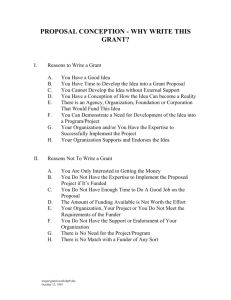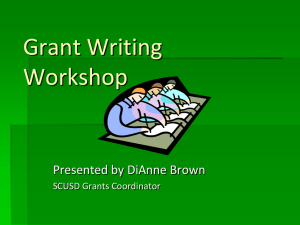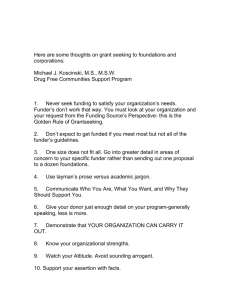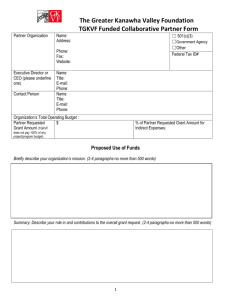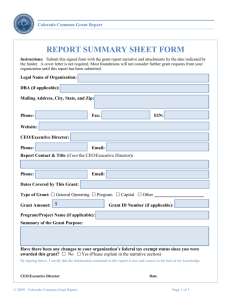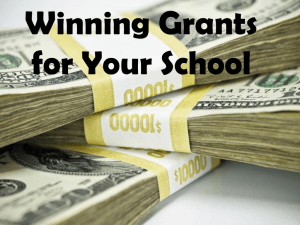Developing Your Grant Proposal Idea
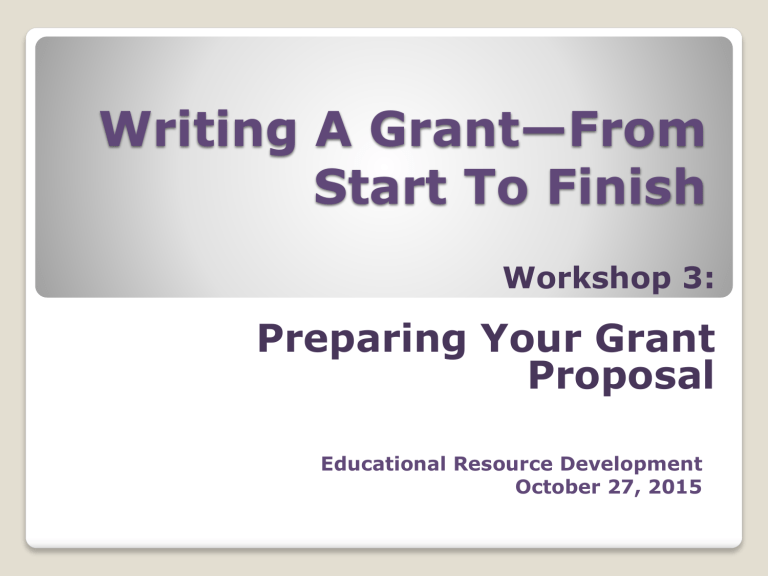
Writing A Grant—From
Start To Finish
Workshop 3:
Preparing Your Grant
Proposal
Educational Resource Development
October 27, 2015
Last week we discussed:
Elements of a successful grant proposal
Identifying an appropriate grant project idea
Developing your project idea
Doing effective group work
Writing a case statement
Developing Your Grant Proposal Idea
This week we’ll discuss:
Working on your case statement
Identifying potential funders and ways to approach them
Steps to prepare a competitive grant proposal
LCC’s grant process
Time to work on your grant proposal idea, case statement, or funder search
Developing Your Grant Proposal Idea
Personal Reflection
What was your experience beginning to draft a case statement?
What went well, what could have gone better?
What did you learn?
If you were to continue working on this, what next steps would you take?
Developing Your Grant Proposal Idea
Moving from Case Statement to
Grant Proposal
•
Researching potential funders
Working with LCC Team
Project partners—internal/external
Working With Outside Consultants
Grant Writers
Project Evaluators
Developing Your Grant Proposal Idea
Preparing a Work Team Timeline
•
Work team leader
Major milestones and dates
Additional comments
Proposal finished for internal review one week before due date
Developing Your Grant Proposal Idea
Planning the Narrative
Follow the narrative requirements detailed in the RFP
Note research needed
Note internal/external information sources
Note who on the work team will gather each type of information
Note who will write each section of the draft
Developing Your Grant Proposal Idea
Narrative Sequence
• Put information in the same order as listed in the RFP
• Include all information requested in the instructions
In Federal grant RFP’s, check both the application content and the reviewers’ criteria sections
• In Federal grants, check for requirements not included in the RFP
Developing Your Grant Proposal Idea
Creating Logic Models
Used to help plan, implement, and evaluate a project
Goals: The large picture why you want to do this project
Objectives: Measurable items your project will achieve
Activities: What you will do to implement your project
Inputs: What your organization and/or partners will provide to implement the project
Outputs: What is produced by the project
Outcomes: Changes or benefits that result from the project
Kellogg Foundation Logic Model Development Guide https://www.wkkf.org/resource-directory/resource/2006/02/wk-kellogg-foundation-logicmodel-developmentguide
United Way of Greater Richmond and Petersburg: A Guide to Developing an Outcome
Logic Model and Measurement Plan http://www.yourunitedway.org/sites/uwaygrp.oneeach.org/files/Guide_for_Logic_Models_and_
Measurements.pdf
Developing Your Grant Proposal Idea
The Importance of Good Story Telling
Craft your narrative for the reader (formal; informal)—make it relevant
Use settings, characters, antagonists, and resolutions to pull the reader in
Include pertinent, engaging support (individual or community stories, similar successful programs, data, etc.)
Developing Your Grant Proposal Idea
Write to your audience
In grant proposals, the levels of expected formality shift depending on who you are writing to. For local family foundations, you can afford to take a warmer, more personal tone.
In research proposals, it's all thirdperson clinical prose. You adapt .
Cheryl Kester
The Kester Group eNewsletter
March 3, 2015
Developing Your Grant Proposal Idea
Project Evaluation
The application may or may not require project evaluation, but always include it in your planning
• Six purposes of evaluation
◦ To find out if the hypothesis was right—did what you set out to do
◦ To determine if specified methods were used and objectives met
◦ To find out if an impact was made on the identified need
◦ To obtain feedback from the people served and other members of the community
◦ To maintain control over the project (evaluations are done at various points in the project)
◦ To make changes in the program mid-stream, if necessary, to insure the program's success.
• Include quantitative and qualitative measures
• Outside evaluators
Developing Your Grant Proposal Idea
Visual Impact
Graphics--charts, graphs, tables, maps, photographs
Headers and subheaders
Color and font
•
Reference visuals in the text
Be mindful of page limits
Developing Your Grant Proposal Idea
The Importance Of the Budget
•
The budget is the application’s meat and bones
The budget, budget narrative, and project narrative have to be consistent
Developing Your Grant Proposal Idea
Planning the Budget
Expense: plus
Direct costs (project specific)
Indirect costs (building, utilities, insurance, etc.)
Income:
Program specific income (grants and other sources) plus
In-kind (cash or non-cash)
Developing Your Grant Proposal Idea
Calculating costs:
Personnel (existing and projected, estimated hours or percentage)
Fringe benefits (existing and projected)
Consultants (not grant writers!)
Travel (approved rate)
Equipment (per item; document)
Supplies (per item; document)
Tuition (per student)
Others
Developing Your Grant Proposal Idea
•
•
•
•
•
•
•
•
Calculating Income
Requested grant funds
Other anticipated or received grant funds
Donations (cash or in-kind)
Course Fees
Tuition
Refreshment and merchandise sales
Advertisement sales
Organization matching funds
Developing Your Grant Proposal Idea
LCC Grants Finance Office
Judy Koos, ext. 9785
Anita Lycos, ext. 9807
Barb Farr, ext. 1737
Developing Your Grant Proposal Idea
Using a Grant Application Checklist
One may be provided in the application
Check to make sure your checklist contains everything needed in the application—federal grants can be inconsistent
You may need to construct one
Get multiple readers’ reviews, esp. those outside of the process
Follow LCC’s grant approval and submission process from start to finish
Developing Your Grant Proposal Idea
The 10 Most Common Reasons Grants
Are Declined
Does not meet funder’s priorities
Does not serve funder’s geographic area
Incorrect application format
Difficult to understand
Outside of funder’s grant award range
Unknown credibility of applicant
Project lacks urgency or impact
Narrative, budget, and timeline not consistent
No more money available this grant cycle
No evidence project will become self-sufficient
Developing Your Grant Proposal Idea
To consider for next week’s workshop:
Research a potential funder for your project
Complete a Prospect Worksheet for that funder— are they a good fit?
Build on your Case Statement and asses what additional information you need to gather to write to that funder
Developing Your Grant Proposal Idea
Time to Write!
Developing Your Grant Proposal Idea
Contact ERD and the LCC Foundation:
ERD
Jeanne Donado, Grant Development Coordinator ext. 1307
Vivian Keeney, Grant System Coordinator ext. 1581
LCC Foundation
Dan McKean, Executive Director, ext. 1987
Peggy Hellwig, Scholarship and Operations
Coordinator, ext. 1989
Developing Your Grant Proposal Idea
